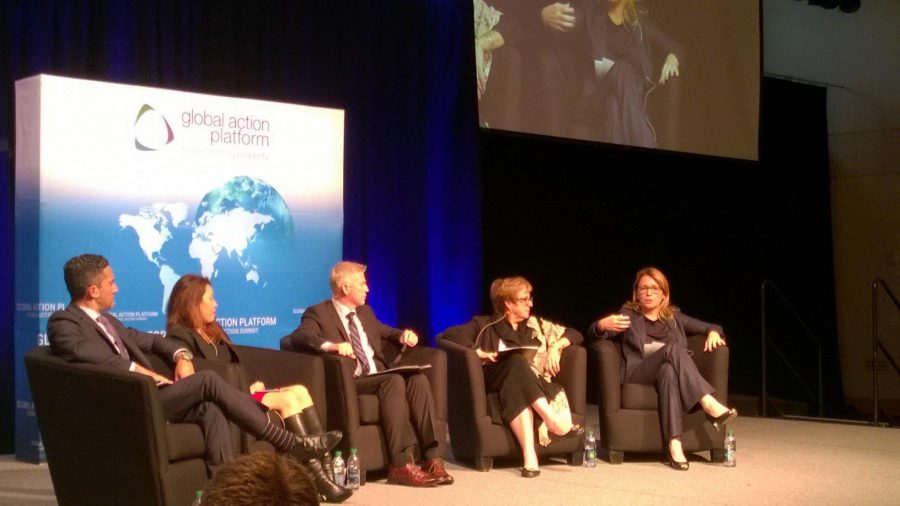Business leaders, researchers, global agencies and non-governmental organization (NGO) directors gathered at Vanderbilt for the Nashville Global Action Summit, an annual invitation-only forum held Nov. 14–15 focused on discussing viewpoints on food, health and prosperity. Among its attendants was the Millennium Challenge Corporation, led by its CEO, Dana Hyde. Hyde sat down with the Hustler to explain her organization’s efforts and what Vanderbilt students can do to help.
Before MCC began their initiative in Liberia in Oct. 2015, less than three percent of the country’s population had access to electricity. The full capacity of the power grid serving the whole country was less than the one serving many U.S. malls.
MCC is a U.S. development agency created by Congress in Jan. 2004 with its goal rooted in remedying international poverty through economic growth, according to Hyde.
“International development work is not just a passion of mine, but my entire staff,” Hyde said. “It’s a unique combination of professionals who … want to dedicate their careers to helping solve some of the world’s hardest, most heart-wrenching problems. We’re able to do that at MCC and also to do it on behalf of the United States. So it’s certainly compelling for the partner countries and the communities that we’re working with, but it’s also something I feel is very important to America’s interests.”
The organization spurs this economic growth by providing grants to the country’s government, the process for which involves three features: competitive selection, country-led solutions and country-led implementation. Before a country is eligible for a grant, the MCC board examines its performance based on a scorecard of indicators viewable online. Countries must identify their priorities in attaining sustainable economic growth and reduction in poverty and deliver proposals to the MCC after consultation within their society. After the funds are awarded in the form of a Millennium Challenge Account, the country awarded the funds manages their overseeing and implementation.
According to the MCC website, the main criteria for receiving grants is good governance, economic freedom and dedication to carrying out the wishes of citizens. Once this broad criteria and more-specific scorecard criteria has been met, a country receives one of two MCC grants: a compact or a threshold program. Compacts are large five-year grants of roughly $350 million for countries meeting MCC’s eligibility criteria. The threshold program consists of smaller grants to countries nearly meeting the criteria and dedicated to improving future performance.
CEO Hyde cited the Liberia Compact as one of MCC’s most important current projects, focused on improving road infrastructure and access to reliable and affordable electricity throughout the country. The terms of the compact include funding for redevelopment of the Mt. Coffee Hydroelectric Plant, development of a training center for technicians working in electricity, support for the creation of an independent regulator for the energy sector and development of an effective approach to nationwide road maintenance.
After a recent visit to Liberia during the MCC Powering Africa trip, a visit to four partner countries with major MCC investments, Benin, Sierra Leone, Ghana and Liberia, MCC Hyde said she saw the beginnings of the implications of MCC’s work in electricity and infrastructure in Liberia.
“We were able to visit some of the small shop owners, talk with some of the families in Liberia and just have a very deep sense of what that will mean for their lives and how it can help create jobs that will be really throughout the country,” Hyde said.
Looking into their future in international development, MCC has compiled a five-year strategy called NEXT, founded on the idea that a data-driven, evidence based, competitive approach is an important foundation and something the company hopes to strengthen moving forward. The plan consists of five goals: opportunities, incentives, leverage, measurement and world-class. Within each category are more-detailed objectives such as expanding to an entire region rather than focusing on individual countries and continuing to strengthen work around data.
As for the next generation, the generation that stands to inherit the global issues MCC is currently working to remedy, Hyde stresses the importance of being an active local and global citizen.
“I would just encourage all of your readers to engage in the world, and there’s so many outlets both on campus and after campus to do so,” Hyde said. “Wherever I travel, I always make it a point to meet with Peace Corp volunteers, … and it’s really inspiring to see in communities, developing communities, what they do and what they’re able to contribute to this bigger picture. … So the message is that there is meaningful and challenging and highly-impactful work around the globe in global-development, and I would urge you to look at it.”

